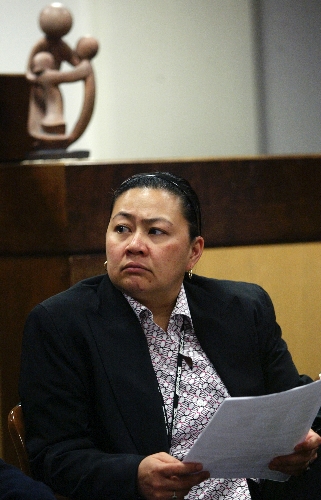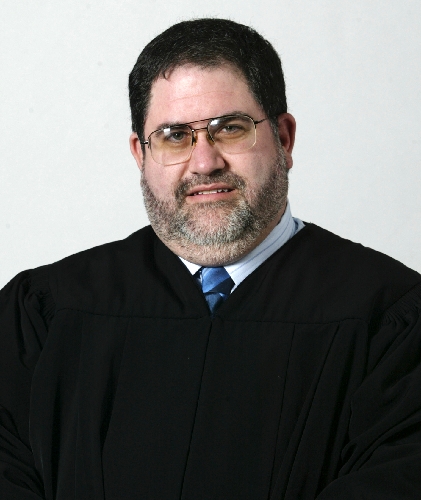Judging the Judges: Lawyers go to extremes on Family Court judges’ ratings
Some scores went up, some went down, but lawyers showed little ambivalence when rating the performance of two Family Court judges at the bottom of the list.
For the second year in a row, lawyers sent the message that Cheryl Moss and Kenneth Pollock should find different jobs.
Attorneys rated 20 Family Court judges in the Las Vegas Review-Journal's 2011 Judicial Performance Evaluation, and fewer than 50 percent said Moss and Pollock should be retained.
On the flip side, a whopping 94 percent recommended retention for Bryce Duckworth, who was followed closely by Frank Sullivan with 93 percent and Charles Hoskin with 91 percent.
The question is temporarily moot, however, because no Family Court judges must face voters this year.
Moss and Pollock declined to be interviewed for this story, although they both commented on their low scores in 2010.
The confidential survey allowed lawyers to submit anonymous comments about the judges they rated, but one attorney agreed to go on the record with some of his opinions.
Bruce Shapiro, who has practiced family law in Clark County for two decades, said Moss was an inexperienced lawyer when she was first elected.
"She tries hard and she tries to do the right thing but sometimes just doesn't get it," Shapiro said. "I think the biggest problem with Judge Moss is that she's not getting better, although she's been a judge for more than 10 years now."
In the most recent survey, 43 percent of responding lawyers said Moss should be retained, up from 36 percent the previous year.
In 2011, more lawyers who are women wanted to keep Moss than did male lawyers. Her retention score among women was 55 percent; among men it was 34 percent.
Only four judges of 90 rated in the survey showed statistically significant differences in retention ratings given them by men and by women.
All Clark County lawyers with active Bar membership were invited to rate judges, and they pledged to rate only those with whom they have direct experience recent enough to make an informed judgment. In the latest survey, 103 chose to rate Moss.
Moss received her highest retention score in 2002, the first year she was evaluated, when 65 percent of respondents said she should be retained.
She has been involved in several controversies over the years.
In 2008, for example, the judge ruled that Rob Bassett could spend 10 days with his 8-year-old son during each month of the boy's summer vacation, even though the boy was the victim in a child abuse case then pending against Bassett.
The boy's mother refused to allow that, telling the Review-Journal, "I had to violate the order to get help."
Bassett had primary physical custody of his son until February 2008, when both Bassett and the boy, then 7, tested positive for methamphetamine.
Moss did not hold the mother in contempt of court for refusing to permit the unsupervised visits.
"I think the court's been duped by the father," Moss said at a later hearing.
The boy was 10 when he spoke at his father's sentencing hearing in December 2010, saying, "Please don't let him hurt me again."
District Judge Douglas Herndon imposed a sentence of one to four years in prison.
In the 2011 survey, Moss received her worst score on a question about punctuality and her best score on a question about courtesy.
When asked whether Moss is punctual in convening court, keeps business moving, and does an amount of work fair to taxpayers and to other judges, 58 percent of the respondents rated her "less than adequate."
Many of the written comments touched on that issue.
"Having a case before this judge guarantees that the fees incurred by the client will be almost double," one lawyer remarked. "The wait time to be heard is outrageous and, in spite of the number of years on the bench, Judge Moss has never learned to manage her calendar in a timely fashion. It is one thing to be patient; it is quite another to allow lawyers and litigants to go on at will."
A majority of the lawyers also gave Moss a "less than adequate" rating on questions about whether her rulings are appropriate and whether she properly applies the law.
On the question about courtesy, 45 percent of the respondents described her as "more than adequate," and 47 percent called her "adequate."
Pollock was evaluated for the first time in 2010, when 47 percent of the attorneys said they would recommend retaining him. In 2011, 46 percent recommended retention.
"Judge Pollock seems like a nice guy, but he really doesn't have a good feel for the issues in Family Court or the role of a judge," Shapiro said.
In the latter survey, Pollock received his worst score, 51 percent less than adequate, on the appropriateness of his rulings. Nearly as many, 47 percent, rated Pollock less than adequate on applying law and rules properly.
"Although he didn't have a lot of experience in contested Family Court cases, he thinks he knows more than experienced attorneys," Shapiro said. "He often makes up his own procedural rules that make it more expensive for litigants and more inconvenient for lawyers. Rather than making the process easier, he seems to go out of his way to make it more difficult, and I believe this is why he scored near the bottom."
In 2010, Pollock said his poor scores were more about campaign politics than performance. With only 98 lawyers rating him, he said, it was possible that those who gave him poor scores were supporters of Susan Scann, his opponent at the time in a District Court election.
Pollock lost that race, but his involvement in it made some attorneys question his devotion to Family Court.
"Good judge, but needs to commit to Family Court and not run for other offices," one wrote.
Sandra Pomrenze barely received the approval of lawyers who rated her in 2011, as 54 percent recommended her retention. The previous year, 56 percent favored keeping her on the bench.
In the most recent survey, she received her worst score on the question about courtesy, with 54 percent of the lawyers rating her "less than adequate."
In written comments several respondents described Pomrenze as rude.
One simply wrote, "It's a close call on whether she should stay on the bench."
In November, the Nevada Supreme Court removed Pomrenze from a custody case and vacated part of her order in the case.
Shapiro represented the mother, Michelle Anne Pearson, who was seeking permission to move to Ohio with her three children.
At an initial hearing, Pomrenze found that Pearson had presented adequate cause to hold an evidentiary hearing on the matter. However, the judge would not conduct the hearing until the mother had deposited $25,000 into a blocked account. The money would cover the father's attorney fees if she did not prevail on her motion to modify the parents' joint custody arrangement.
The high court found that Pomrenze had "manifestly abused" her discretion, and it vacated the part of her order that required a $25,000 deposit.
Shapiro declined to comment on the pending case, but in his emergency petition to the state Supreme Court he argued that Pomrenze had violated his client's "right of procedural due process and constitutional right of access to the courts."
Jennifer Elliott's scores declined significantly from 2010 to 2011, and written comments suggest a couple of causes. In the earlier survey, 70 percent of the attorneys thought she should be retained, but that score dropped to 59 percent in the latest survey.
Her worst score came on the question of punctuality, with 37 percent of the lawyers rating her "less than adequate."
"A judge needs to be present to be effective," one lawyer wrote.
Commented another: "Judge Elliott has suffered a number of illnesses and personal challenges which have interfered with her ability to handle her judicial duties. She is frequently absent from the bench, requiring cases to be reassigned at the last minute, heard by substitute judges, etc."
Elliott acknowledged that she missed a lot of work during the past year because of an illness, although she declined to discuss specifics.
"I got back from a cruise, and I was very sick when I came back," she said.
Elliott said she took a cruise to Mexico in December 2010. She said she has been working regularly since the beginning of October.
"I'm back enjoying my job, but it was a tough year, believe me," the judge said.
One lawyer commented on Elliott's decision to hire Douglas Crawford, a suspended personal injury attorney, as a law clerk.
"Regardless of her motives to help out this attorney, this does not look good for her," according to the anonymous comment. "But this should not be held against her, since she is a real tribute to Family Court in so many other ways."
Crawford resigned Nov. 1, a day after pleading guilty to two felony theft charges for stealing more than $300,000 from clients. He said he stole the money to support gambling, alcohol and drug addictions.
Elliott said she hired Crawford because of his talents and skills. The judge, a licensed marriage and family therapist, also said she believed Crawford had cleaned up his act and deserved a second chance.
"I feel like I would have been a hypocrite to have done anything different," she said.
The top-rated Duckworth was evaluated for the first time in 2010, when 89 percent of the lawyers said he should be retained. In 2011, that score rose to 94 percent.
He received high marks on all issues, with 89 percent rating him "more than adequate" on courtesy.
Asked whether Duckworth demonstrates familiarity with the case record and documents, and whether he fairly weighs all evidence and arguments before rendering a decision, 80 percent rated him "more than adequate."
Several written comments referred to the judge's calm demeanor.
"It really defines who I am," Duckworth said. "This is what you get from me."
The judge also said he personally reads every document filed in the cases assigned to him, because that's what he wanted from judges when he represented clients as a lawyer.
Gloria Sanchez, the court's presiding judge since 2009, was one of the court's six original judges. She has been evaluated by lawyers 10 times since the Review-Journal began conducting its surveys in 1992.
Sanchez has consistently scored well, with more than 80 percent of the respondents recommending her for retention in each survey. In 2008, 97 percent of the lawyers thought she should retain her seat. That rating dropped to 92 percent in 2010 and to 88 percent in 2011.
"My work is primarily administrative right now," Sanchez said.
Her worst score on the 2011 survey involved punctuality, with 24 percent of the lawyers rating her "less than adequate."
"Oftentimes I'll get sidetracked with an administrative issue on my way to court," she acknowledged.
Sanchez said she has found the constructive criticism in the surveys helpful over the years, although she dislikes the "destructive commentary" she has seen other judges receive.
She specifically said two of the court's newer judges, Duckworth and Sullivan, deserved high praise. And that's what lawyers gave them in both 2010 and 2011.
Two judges who were evaluated for the first time in 2011 did not fare as well. Gayle Nathan received a recommendation for retention from 59 percent of the lawyers who rated her, and 68 percent of the lawyers thought Vincent Ochoa should be retained.
Sanchez said she takes the written comments of lawyers to heart. For instance, she changed her approach after lawyers complained in earlier surveys that she took too much time to issue decisions.
"I began to rule more from the bench," she said.
Sanchez said she found it easier to issue written decisions after emotions had calmed down, but she eventually got better at giving bad news firsthand.
"Even if it's bad news, give it to them now," she said. "They'd rather have it now, and I learned that through the survey."
Contact reporter Carri Geer Thevenot at cgeer@reviewjournal.com or 702-384-8710.
Judging the Judges - 2011



















